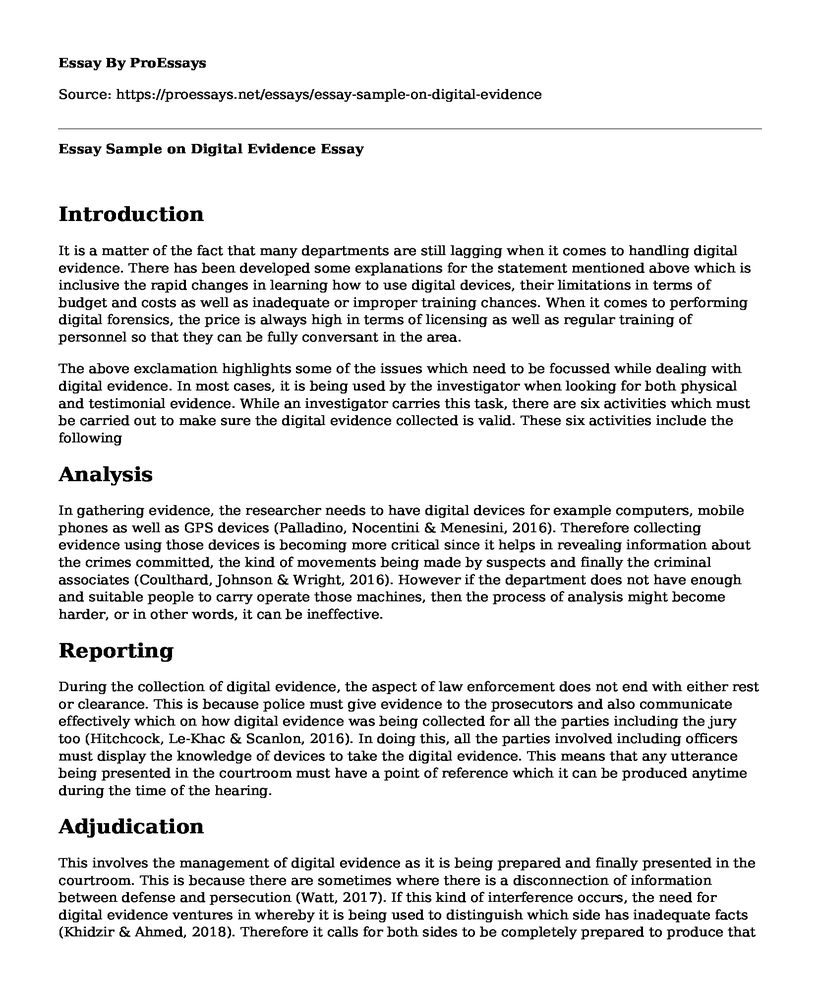Introduction
It is a matter of the fact that many departments are still lagging when it comes to handling digital evidence. There has been developed some explanations for the statement mentioned above which is inclusive the rapid changes in learning how to use digital devices, their limitations in terms of budget and costs as well as inadequate or improper training chances. When it comes to performing digital forensics, the price is always high in terms of licensing as well as regular training of personnel so that they can be fully conversant in the area.
The above exclamation highlights some of the issues which need to be focussed while dealing with digital evidence. In most cases, it is being used by the investigator when looking for both physical and testimonial evidence. While an investigator carries this task, there are six activities which must be carried out to make sure the digital evidence collected is valid. These six activities include the following
Analysis
In gathering evidence, the researcher needs to have digital devices for example computers, mobile phones as well as GPS devices (Palladino, Nocentini & Menesini, 2016). Therefore collecting evidence using those devices is becoming more critical since it helps in revealing information about the crimes committed, the kind of movements being made by suspects and finally the criminal associates (Coulthard, Johnson & Wright, 2016). However if the department does not have enough and suitable people to carry operate those machines, then the process of analysis might become harder, or in other words, it can be ineffective.
Reporting
During the collection of digital evidence, the aspect of law enforcement does not end with either rest or clearance. This is because police must give evidence to the prosecutors and also communicate effectively which on how digital evidence was being collected for all the parties including the jury too (Hitchcock, Le-Khac & Scanlon, 2016). In doing this, all the parties involved including officers must display the knowledge of devices to take the digital evidence. This means that any utterance being presented in the courtroom must have a point of reference which it can be produced anytime during the time of the hearing.
Adjudication
This involves the management of digital evidence as it is being prepared and finally presented in the courtroom. This is because there are sometimes where there is a disconnection of information between defense and persecution (Watt, 2017). If this kind of interference occurs, the need for digital evidence ventures in whereby it is being used to distinguish which side has inadequate facts (Khidzir & Ahmed, 2018). Therefore it calls for both sides to be completely prepared to produce that evidence in a courtroom when being called upon.
Execution of the Law
This is the point where judgment is being determined by the kind of digital evidence presented by both parties. The judges are doing it, and juries attorney generals as well as the defense side has a stake or analyzed the digital proof and passes the judgment accordingly (Watt, 2017). This is the full indication of whether digital evidence has been well understood.
Appealing
This is the process whereby if there is any side which is not satisfied by the judgment, the appeal is done to seek more justice. Either of the party which feels that there is no justice must come with more concrete digital evidence with the aim of overturning the court decision on their favor (Watt, 2017). The added digital evidence must also be processed to determine whether it is viable.
Final Judgment
This is the point whereby after second hearing or appeal, the report is being done in relative to the kind of digital evidence that is being processed. Since this decision is final, the digital evidence used to come up with it is regarded as the superior.
References
Coulthard, M., Johnson, A., & Wright, D. (2016). An introduction to forensic linguistics: Language in evidence. Routledge. Retrieved from https://www.taylorfrancis.com/books/9781317246664
Hitchcock, B., Le-Khac, N. A., & Scanlon, M. (2016). Tiered forensic methodology model for Digital Field Triage by non-digital evidence specialists. Digital Investigation, 16, S75-S85. Retrieved from https://www.sciencedirect.com/science/article/pii/S1742287616300044
Khidzir, N. Z., & Ahmed, S. A. A. M. (2018). Towards Fact-Based Digital Forensic Evidence Collection Methodology. Available at SSRN 3197444. Retrieved from https://papers.ssrn.com/sol3/papers.cfm?abstract_id=3197444
Martini, B., Do, Q., & Choo, K. K. R. (2015). Conceptual evidence collection and analysis methodology for Android devices. ArXiv preprint arXiv: 1506.05527. Retrieved from https://arxiv.org/abs/1506.05527
Palladino, B. E., Nocentini, A., & Menesini, E. (2016). Evidencebased intervention against bullying and cyberbullying: Evaluation of the No Trap! Program in two independent trials. Aggressive behavior, 42(2), 194-206. Retrieved from https://onlinelibrary.wiley.com/doi/abs/10.1002/ab.21636
Quick, D., & Choo, K. K. R. (2016). Significant forensic data reduction: digital forensic images and electronic evidence. Cluster Computing, 19(2), 723-740. Retrieved from https://link.springer.com/article/10.1007/s10586-016-0553-1
Quick, D., & Choo, K. K. R. (2018). Big Digital Forensic Data: Volume 2: Quick Analysis for Evidence and Intelligence. Springer. Retrieved from https://link.springer.com/content/pdf/10.1007/978-981-13-0263-3.pdf
Watt, A. (2017). The challenges of interpreting digital evidence in the courtroom. Precedent (Sydney, NSW), (139), 43. Retrieved from https://search.informit.com.au/fullText;dn=789477435969869;res=IELHSS
Cite this page
Essay Sample on Digital Evidence. (2022, Nov 14). Retrieved from https://proessays.net/essays/essay-sample-on-digital-evidence
If you are the original author of this essay and no longer wish to have it published on the ProEssays website, please click below to request its removal:
- Pipeline Scanning Robots
- Research Paper Sample: Google's Culture and Organizational Structure Attributes to Its Success
- Digital Culture Transformation Paper Example
- Essay Sample on Insurance Industry and Mobile Technology Risks
- Essay Sample on Artificial Intelligence and its Importance in Market Segmentation and Targeting
- AI and Society: Ethical Guidelines for Coexistence - Essay Sample
- The Mobile Revolution: Catering to Consumers' Needs &Preferences - Essay Sample







